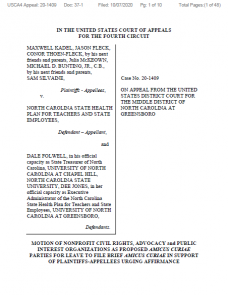
Another Victory!: On June 10, 2022, the district court ruled that North Carolina’s state health plan violates Title VII and the Equal Protection Clause by excluding coverage of gender affirming healthcare for transgender employees. The court reserved a decision on the plaintiffs’ Section 1557 claim pending an anticipated rulemaking from the Biden Administration.
*********
Victory!: On September 1, 2021, the U.S. Court of Appeals for the Fourth Circuit ruled against North Carolina, allowing the plaintiffs to move forward with their challenge to the state’s discriminatory health plan that denies transgender individuals coverage for gender-affirming care. The appellate court ruled that by accepting federal financial assistance, the state had waived its sovereign immunity in suits alleging violations of federal anti-discrimination laws—including violations of Section 1557 of the Affordable Care Act. The case will now return to the district court. For further analysis of the decision, see Lambda Legal’s full statement here.
*********
On October 7, 2020, NWLC joined an amicus brief to the U.S. Court of Appeals for the Fourth Circuit led by the Harvard Center for Health Law and Policy Innovation (CHLPI) and the Quinnipiac University School of Law Legal Clinic. This case involves a challenge to North Carolina’s discriminatory state health plan that denies transgender individuals coverage for gender-affirming care. The plaintiffs sued under Section 1557 of the Affordable Care Act—the provision that prohibits discrimination in health care on the basis of sex (including sexual orientation, gender identity, and pregnancy), race, national origin, age, and disability. The lower court—the United States District Court for the Middle District of North Carolina—decided that plaintiffs’ sex discrimination claim under the Section 1557 could go forward. On appeal, the state is arguing that it is entitled to sovereign immunity for this claim and therefore immune from suit. The amicus brief highlights the many ways that states engage in discriminatory practices that violate Section 1557 and emphasizes the vital role that private lawsuits and related monetary damages play in remedying the harms of discrimination and vindicating civil rights.

